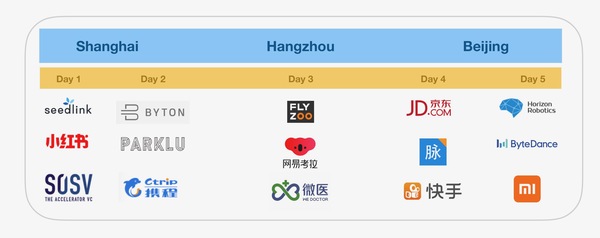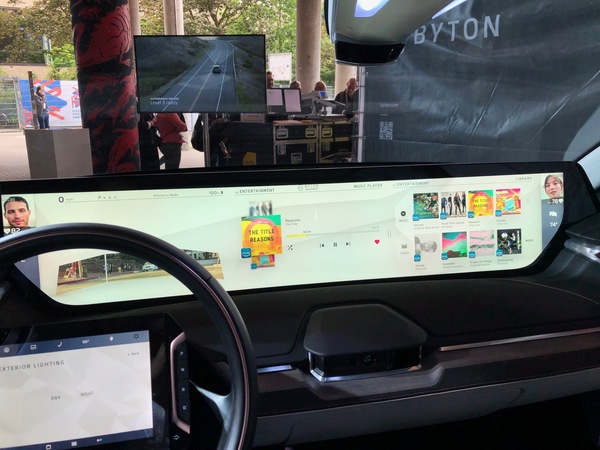ChinaBriefs on Tour - getting inspired by visiting Digital China
As part of our overall mission - educating Western companies about what is happening in DigitalChina - we are occasionally facilitating tailored trips for Western senior executives to visit digital champions in China. And just two weeks ago we finished the latest of these trips visiting companies in Shanghai, Hangzhou and Beijing. Main lesson: even though our last tour of those companies has only happened five months earlier, massive changes have been witnessed already - again!
We started in Shanghai with a visit to a small startup in the HR - AI space called Seedlink Technology. They have developed an amazing technology: a “cultural fit prediction model” that uses the company’s self-developed AI to measure a candidate’s cultural fit to the company simply by answering a set of three randomly chosen questions. L'Oreal, INDITEX and Coca Cola are some of their early customers in Europe. If you want to learn more about them, there is an interesting report about Seedlink by the BBC available. What is surprising about this company and its founder Robin Young is that from the outset they were focussing on internationalizing with an early second office in Amsterdam to head sales in Europe.
Next stop was Xiaohongshu aka RED or Little Red Book, China’s homegrown social commerce content powerhouse and app. Xiaohongshu is often described as “a sharing platform for young people’s lifestyles through user generated content. The platform is designed to help users discover and purchase products, share recommendations, and provide helpful tips. You could think of Xiaohongshu as a combination of Pinterest and Instagram.
They were just going through some tumultuous times as they were in the process of cleaning out their - admittedly - huge stable of on-the-platform KOLs (Key Opinion Leader aka Influencer). Some people called it a purge as the number went from 17,000 down to “only’ 5,000 influencers - depending on their number of fans. At the same time, they changed the business model for influencer: RED would now also charge a commission on the influencer’s earnings, who will have to register with the platform to be eligible for cooperation (For more on this topic, check out PanDaily or this article on Chinese with Google Translate)
They also just made a big splash by announcing that Louis Vuitton has launched an account with them, the first luxury brand to have an official presence on the female-led platform to capitalize on its 200 million-plus users, 60 percent of whom are from tier-one and tier-two cities, and more than 70 percent are China’s post-Nineties generation or young Millennials.
Xiaohongshu is expected to double its revenue to US$2.9 billion next year.
Last stop for the day was a visit to the office of the ever impressive William Bao Bean and his company SOSV - The Accelerator VC, which is investing in a whopping 150 startups a year on average.
The office is basically a very cost-effective co-working space where most of the portfolio companies are based for between 3 to 6 months of an acceleration period with access to mentors with deep market and technical expertise and an unparalleled infrastructure of fully outfitted laboratory & maker spaces. After an intro by William we saw pitches from three of their current portfolio companies: 247, Ocheng and Shopal.
Day 2 started with a tour of the brand new showroom of BYTON - one of China’s most prominent electric car startups - which by the way has a German CEO: Daniel Kirchert (who wrote the intro to our first newsletter).
After the exit of one of the founders earlier this year, the company had gotten some negative media coverage. But they faced all challenges head on and Byton is now on its way to close the C round of fundraising with FAW as lead investor.
We saw a presentation of the new factory that is currently being built and scheduled to be completed by year-end in nearby Nanjing and inspected the two BYTON models in the showroom. The nascent brand is already known for having revolutionized the way we think about car interiors - just take a look at this enormous dashboard display in the front of the car.
Afterwards we headed straight to the office of Parklu.com - China’s premier influencer platform, where you can create, activate, track and analyze KOL campaigns. CMO Eli Whaley gave us an intro into China’s influencer/KOLs world. It was a fascinating insight into the rich social media landscape that China has to offer as it’s not only Wechat and Weibo, but also Douyin, Kuaishou, Yinke, Meitu, Meipai, Weitao, Yzhibo and many more. Eli is one the few foreigners with a deep understanding of all these platform and how to segment and leverage them according to a brand’s positioning. If you’re interested in Eli’s presentation, please let us know.
Next on the lis, a giant in China’s online travel space: Ctrip - with a revenue of US$4.5B in 2018.
Their offices are way out near the Hongqiao airport and train station. The company has already 30,000 employees with branches in Singapore, Japan, Korea, Australia, Thailand, America and the UK. For our German readers we have just learned that the Germany office is scheduled to open in Frankfurt in Junethis year. The company is currently only generating 30% of its revenue with overseas trips which they want to increase to 50 per cent over the next years.
Always keep in mind that at present still only 7% of the Chinese population is holding a passport. Also, Ctrip is increasingly adopting M&A to stave off competition and expand its ops globally as seen in the acquisition of 49% in Indian online travel company MakeMyTrip.
Leaving Shanghai we boarded a high-speed train to Hangzhou - the ecommerce city of China and where the headquarters of Alibaba are located.
Our first stop for the day was: Wedoctor. The company was founded by Jerry Liao in 2010. His ambition was to build an Amazon for health care. Today the outfit is valued at $5.5 billion with services like:
online consultations,
drug prescriptions,
actual clinics staffed by physicians.
AIs to analyze data, helping detect ailments like cervical cancer.
During our tour of the headquarter we could inspect many of the offline hardware and components to remotely run mobile ambulances in far-flung regions of China and as far way as Africa as well as units for corporate clinics for China’s high-tech companies that often have thousands if not tens of thousands of employees. We also saw an Amazon Echo-like $600 speaker for home use that links to fitness wearables and doubles as a doctors’ hotline with a nurse on duty 24/7 for remote diagnosis.
Wedoctor is not yet profitable and while making preparations for an IPO, it became quite apparent, that the amount of domestic patient data the company holds might make it difficult to list overseas. Times have changed. Chinese companies can now consider to IPO on Shanghai’s new board STAR.
Btw, among all the companies we at ChinaBriefs have visited so far, WeDoctor was the one that left our trip participants truly amazed and “blown away”! So if you have a chance to visit this company, take it!!
Next stop: the Flyzoo Hotel - Alibaba’s autonomous robot-operated hotel experiment right next to the company’s main campus. It’s a fun visit as you can experience automated check-in via face scan. Pretty much the rest of the hotel functions via facial recognition as well: elevators, hotel room doors or vending machines. And if the face doesn’t work then you can surely rely on voice recognition in your room to switch on lights, get the telly going or order food - all through Alibaba’s own TMall Genie (btw Mandarin only, of course).
Then there is the room service, which is done by robots. And even the lobby cafe is run by a RATIO robot arm mixing cocktails or doubling as a barrista for fancy macchiatos.
It’s all cool and gadgety but we still prefer the human touch of a classic hotel. Park Hyatt Hangzhou anyone?
Our last visit for the day took us to the headquarter of Netease where we had an appointment to learn more about it’s cross-border ecommerce business Kaola, where Chinese customers can buy products directly imported from a foreign country - like a NIVEA cream with German label and packaging.
Netease started out as an email, social messaging and gaming business (I remember my first email address in China was from Netease with the famous 163.net address). A few years ago it became obvious that Chinese consumers began upgrading their lifestyles and started craving more and more overseas brands, because of its quality and authenticity. Founder and CEO Ding Lei didn’t wait long and started competing with the big boys at Alibaba and JD.com. Now his platform is leading (and has been for the last eight quarters) this category with a 27% market share according to the latest iiMedia Research.
Kaola as a platform is easy to do business with and they have offices in Frankfurt and Paris for brands to get in touch with them.
We left Hangzhou by plane and arrived late at night in Beijing.
The next morning saw us going straight to the biggest ecommerce player the city has to offer: JD.com with a revenue of 67B USD in 2018 and unlike Alibaba is pursuing a heavy-asset strategywhere it owns and operates large chunks of their logistics networks and warehouses themselves.
We were welcomed by Ella Kidron, senior communication manager at JD.com and her team. By the way, “JD” stands for Jing Dong: Jing as in Beijing and Dong as in Liu Qiangdong, the founder of the company.
His story is a true rags to riches story that began in Beijing’s Northwestern Zhongguancun district with a small stall selling computer spare parts. The HQ we are now visiting has more than 20,000 employees working in it and is truly symbolic for the massive rise ecommerce has seen in China. The ground floor and reception area is where you can witness and inspect all different types of technological innovations around ecommerce, new retail and logistics, including very cool delivery drones that have already been deployed since early 2017 in Zhangwei near Suqian (Liu Qiangdong’s birth place) and other remote areas in China’s vast country side.
JD.com had a tough year in 2018 and the beginning of 2019 but is reorganizing now and is getting ready to prove that it is betting on the right strategy by leveraging its massive logistics empire. Alibaba has a substantial lead but one should never underestimate Mr. Liu’s fighting spirit.
Next up was China’s version of Linkedin: Maimai. The unicorn company was only founded in 2013 by Fan Lin. In the last two years they have gained more momentum by focussing on localized features like individual and group chat rooms as well as anonymous chat that made it also a lot like Glassdoor. From my own experience watching the Chinese tech blogosphere, most of the juicy stuff that is happening in China’s tech companies was first found on Maimai. The app has now more than 50 Mio registered users and clearly overtaken LinkedIn China as most popular job search and professional networking site.
If you ever have to find talent in China, this platform is your go-to solution and maintaining an updated company profile is a “must”. Also the Maimai example goes to show once again that the big foreign incumbents mostly can’t win if they don’t know how to adapt and localize their winning formula for the China market.
Our next stop in Beijing was Xiaomi (Xiǎomǐ 小米). Maybe this is a company that needs less of a formal introduction, first, because its mobile phones are already selling quite well in overseas markets and, second, they have started opening Mi Home stores in Europe and thus receiving wider press coverage in those regions. We were welcomed to the Xiaomi headquarter in Beijing by their international BD team led by Sandy Guo.
Xiaomi is famous in China foremost for its legendary founder and CEO, Mr. Lei Jun, who already has a number of successful startups and exits under his belt. Xiaomi started out as a mobile phone company by, admittedly, borrowing heavily from iPhone's design philosophy - only sold at a much cheaper price points to China's masses. Copying also Apple's retail strategy they now have hundreds of stores worldwide, which still look much like the original.
Following in the footsteps of its early success with mobile phones, they have since been trying to build out an entire ecosystem of very cool home products ranging, from TV sets, to air conditioners, water purifiers, air purifiers, digitally-enabled light bulbs, robot vacuum cleaners, and many more. Only a fraction of those products get sold outside China. The idea behind this otherwise low margin business is to become an - what they called in their pre-IPO prospectus - internet service company. Based on their current stock price and revenue break-down, it seems they are still some distance away from this lofty goal.
Just last week Xiaomi released more info on a planned offensive for the German market - trying to capitalize on the recent troubles of rival Huawei. So, in the near future we can start watching Xiaomi from up close.
By the way, Xiaomi means Little Rice in Chinese and refers to a main staple of Chinese food subtly hinting at how important their products are for one's daily life. If you want to know a bit more on the historical background of Xiaomi, please check this link.
After our Xiaomi visit, we went straight to the close-by offices of Horizon Robotics. Truth be told, this unicorn startup is one of those gems why digital discovery trips to China can be so valuable and insightful.
Started by Mr. Yu Kai, a graduate of the Technical University of Munich and one of the top AI scientists China has. He founded Baidu's Institute of Deep Learning (IDL) and led the first autonomous driving project in China. At the Horizon HQ we were greeted by Gian-Marco Brizzolara, a recent Tsinghua Schwartzmann College graduate, one of the first foreign hires of the young company and a significant indicator of how Chinese tech companies these days eye global expansion early.
The company's main area of expertise is AI edge computing with a focus on 2 use cases: autonomous driving and smart retail.
Edge computing means the ability to process data right there where the action is without the need to first upload data into the cloud thus creating lower latency, but also requiring extremely small and fast processing power. It also meant that the company had to develop their own AI edge processor since nothing of that capacity was on the market yet.
Just to give a few examples of the sheer processing power needed, especially in the areas of autonomous drive and retail, which is where the company is mostly focussed upon: An autonomous-driving vehicle typically generates 600-1,000 TB of data per day and it requires 16,000 trillion calculations on a typical paved road per day to support autonomous driving. Besides their own AI processor, Horizon Robotics is also developing in-house their own superior AI algorithms to be run seamlessly on their chips.
However, it is in the area of smart retail deployment where the company is driving significant revenue today. It helps retailers like the French Beaumanoire Group, Belle Shoes or YH Supermarkets to digitize their retail stores by using smart cameras enabled by edge AI processors. Typical applications are traffic counting and qualification as well as customer path discoveries and resulting in-store zoning recommendations.
Since facial recognition is at the core, the company is making sincere and conscientious efforts to consider the legal and psychological ramifications of an entry into the Western markets. It remains to be seen what the current trade / tech war means for this promising startup.
Sometimes it really is all about keeping the best for last. And so we saved the last stop for the World's second most valuable startup - Bytedance.
Bytedance is currently valued at around 80 bn USD. It's total amount of financing until to date is 4.3 bn USD. And unlike many of the other hot Chinese startups, it is already very profitable. Our host and organizer was Mayan Scharf. She was the first foreign hire and her story symbolizes the meteoric rise of this company: when she joined two and a half year ago the company headcount was 3,000 people. Now? More than 50,000!!!
The company became a household name in China for its addictive and algorithm powered news aggregator app "Jinri Toutiao". Only after they bought Musical.ly and merged it into TikTok, their English language version of what's known as Douyin in China: a short video app that is marching towards global domination and has today's most powerful tech companies in Silicon Valley worried.
The company was founded in 2012 by Mr. Zhang Yiming and today is one of the growing number of Chinese tech companies eying global expansion. In the case of TikTok they are very successful doing so. Bytedance relies mostly on advertising for its revenues which reportedly was close to 8bn USD in 2018. The company plans an IPO soon. So keep an eye out for the prospectus. It might be an interesting stock to own.
This concludes our three part series of "ChinaBriefs on Tour".
We regularly facilitate similar DigitalChina discovery tours - either to the cities mentioned above, but also to others like Shenzhen or Chengdu - usually as a tailor-made event for a specific group or company.
If you are interested in such a trip and would like to know more about how we could support you, just drop us a line...



